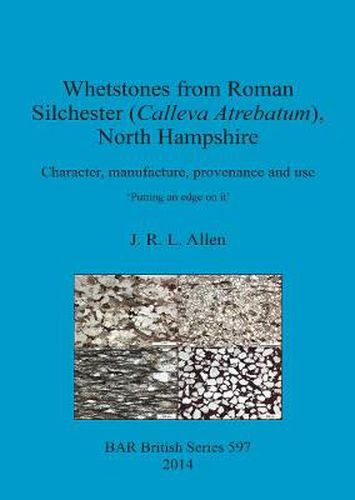Readings Newsletter
Become a Readings Member to make your shopping experience even easier.
Sign in or sign up for free!
You’re not far away from qualifying for FREE standard shipping within Australia
You’ve qualified for FREE standard shipping within Australia
The cart is loading…






This title is printed to order. This book may have been self-published. If so, we cannot guarantee the quality of the content. In the main most books will have gone through the editing process however some may not. We therefore suggest that you be aware of this before ordering this book. If in doubt check either the author or publisher’s details as we are unable to accept any returns unless they are faulty. Please contact us if you have any questions.
The five-hundred year occupation of Insula IX at Silchester has yielded a sequence of 87 whetstones, mostly tabular but some bar- or rod-shaped. These are described, illustrated and characterized with the help of thin-section microscopic petrography. The whetstones originated in many geological sources, not all of which can at present be identified.
Whetstones from the earliest levels at Silchester are comparatively local in origin (sarsen, ironstone) or were made from discarded, imported milling stones (Quartz Conglomerate, Upper Old Red Sandstone). During the first and second centuries AD substantial numbers of bar-shaped whetstones manufactured in the Wroxeter manner from sandstones in the Weald Clay Formation (earliest Cretaceous) were imported into Silchester. Almost all the whetstones of the later Roman period are secondary in character produced from discarded roofing tiles of Brownstones (Lower Old Red Sandstone) and Pennant sandstone (later Upper Carboniferous) imported from the West Country. Small numbers of whetstones can be traced to the Portland Group (Upper Jurassic) and to the Lower and Upper Greensand Groups (Lower Cretaceous). The provision of sharpening stones to Silchester as a whole is estimated to run into many thousands.
$9.00 standard shipping within Australia
FREE standard shipping within Australia for orders over $100.00
Express & International shipping calculated at checkout
This title is printed to order. This book may have been self-published. If so, we cannot guarantee the quality of the content. In the main most books will have gone through the editing process however some may not. We therefore suggest that you be aware of this before ordering this book. If in doubt check either the author or publisher’s details as we are unable to accept any returns unless they are faulty. Please contact us if you have any questions.
The five-hundred year occupation of Insula IX at Silchester has yielded a sequence of 87 whetstones, mostly tabular but some bar- or rod-shaped. These are described, illustrated and characterized with the help of thin-section microscopic petrography. The whetstones originated in many geological sources, not all of which can at present be identified.
Whetstones from the earliest levels at Silchester are comparatively local in origin (sarsen, ironstone) or were made from discarded, imported milling stones (Quartz Conglomerate, Upper Old Red Sandstone). During the first and second centuries AD substantial numbers of bar-shaped whetstones manufactured in the Wroxeter manner from sandstones in the Weald Clay Formation (earliest Cretaceous) were imported into Silchester. Almost all the whetstones of the later Roman period are secondary in character produced from discarded roofing tiles of Brownstones (Lower Old Red Sandstone) and Pennant sandstone (later Upper Carboniferous) imported from the West Country. Small numbers of whetstones can be traced to the Portland Group (Upper Jurassic) and to the Lower and Upper Greensand Groups (Lower Cretaceous). The provision of sharpening stones to Silchester as a whole is estimated to run into many thousands.